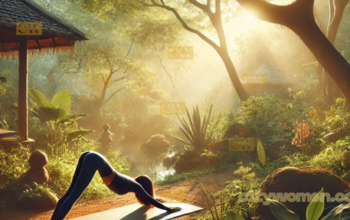
September 27, 2019 at 05:00PM by CWC
I hit adulthood long before the concept of body positivity was a widely held and authentic mainstream thing perpetuated by brands, models, and other voices of influence. I felt, largely as a byproduct of the world in which I was raised, I should despise my imperfections, including those related to my healthy and normal human body. So when a friend nine years my junior began showcasing her body all over Instagram in photos captioned with affirmations, I was baffled. Wait, I thought. She doesn’t hate herself?
I looked for cracks in the facade but quickly realized she wasn’t faking it; she actually feels good in the skin she’s in. And when I clued her in on my internal struggle, she was shocked. Her stance is that no amount of negative self-talk will change the fact that your body is yours—so what’s the point in hating it? She’s totally on the money and has since inspired an epiphany in me to learn to love my body.
This experience led me to change my stance regarding wide discrepancies in friend ages. I once worried about how connecting with someone who makes my pop-culture references feel like history class would reflect on me, but not anymore. The stigma, though, isn’t uncommon. Clinical counselor Karla Ivankovich, PhD, says it’s rooted in the experience of childhood. When we’re younger, she says, maturity levels tend to differ vastly between children of various ages, even when those ages aren’t so widespread. That’s because maturation happens at a much more rapid pace during this phase of life. As we get older, however, the large leaps in personal growth over short periods of time diminish, and engaging in multigenerational relationships becomes a sign of maturity.
To that point, I decided to investigate the power of multigenerational relationships more deeply. Below, get a look at benefits that having a diversified portfolio of friend ages can offer you—and specifically, what you can learn from your younger pals.
They make you feel younger
ADVERTISEMENT
ADVERTISEMENTKate Spade Autumn/Winter Sale |
To start, there’s real, tangible value to be gleaned from befriending people of varying ages. “Being exposed to ways of thinking that people in your immediate age group may not be exposed to is a big benefit of multigenerational friendships,” says friendship expert and author of Frientimacy: How to Deepen Friendships for Lifelong Health and Happiness Shasta Nelson. And the widening of your worldview is just the tip of the good-news iceberg of having a social circle inclusive of varied friend ages. “One of the things that’s really been fun in turning 60 is that I’ve created a whole new set of friendships with young people in their twenties and thirties. That has been an injection of energy,” relationship expert Esther Perel said in an interview with The Sydney Morning Post.
“Being exposed to ways of thinking that people in your immediate age group may not be exposed to is a big benefit of multigenerational friendships.” —Shasta Nelson, friendship expert
Energy, specifically, is a big reason older people may enjoy having younger friends. “As women age, they are also thought to lose the vitality that once made them radiant,” says Dr. Ivankovich. “Friendships remind a woman that she is beautiful at any age, and youth benefits this aspect exponentially.” Though I’m in my thirties, not my sixties, and understand I’m widely considered to be young, I also believe age and how a person feels in relation to it is relative. That being true, the sentiment of feeling younger by associating with younger people rings true for me.
I sometimes need a break from vitality-draining conversations with my circle of similarly aged hens about our waning fertility, and twentysomethings offer just the ticket. (Please, please tell me more about your bartender crush, so I don’t have to think about my ovarian reserve.) My 66-year-old friend Nancy can also relate. “It’s dark, what people my age talk about,” she tells me, noting that she and her best friend had spent their coffee date that morning crying over their recently deceased parents. To her, my fertility-related concerns seem manageable, lighter, and less bleak than what’s on her plate—largely because she’s already past (and passed) that point of life.
They reinforce that you’re as young as you already feel
Beyond this sense of letting the youth of others “rub off” on you, another reason having younger friend is so important is because they can help a person live their biological age (how old a person seems) rather than chronological one (how many years the person has been alive). Nelson tells me she has clients in their sixties who feel they have more in common with women 10 to 15 years younger because they feel more aligned energetically. They aren’t as keen, in other words, to hang out with people their age, who don’t feel nearly as vital.
Nancy tells me she relates, that she doesn’t “feel her age,” and that she enjoys spending time with younger women who are still in the midst of their careers, where she feels she is, too. She felt right at home at Stanford University, where she continued her education last year, for example—even though many of her classmates were as young as her own children.
They provide the benefits of reverse mentoring
At Stanford, Nancy encountered another benefit of bonding with younger people: reverse mentoring, which involves a younger person teaching skills to an elder. My dad, a professor, says he utilizes his students for this purpose, to help “keep him relevant.” And while companies may institute formal programs for reverse mentoring where a younger employee mentors an older, and likely more senior, employee about newer innovations, the practice also happens all the time informally. Even when it’s a matter of clueing in a parent about social media or how to make sense of the latest Apple update, the effect is twofold: The younger person is empowered by being able to offer valuable information, and both parties involved are likely to bond as a result of the experience.
The benefits of reverse mentoring go both ways since effects of more traditional mentoring—an older person who’s seasoned with experience guiding a younger person—also apply. “Befriending somebody who’s younger and helping them walk through a life stage or experience that you have already gone through can foster closeness and that can feel really good,” says therapist and friendship expert Miriam Kirmayer. Plus, Dr. Ivanovich makes another good point: “[Friendships with younger people] can also offer you the unique opportunity to experience life a second time around,” she says.
They promote a sense of fulfillment, happiness, and life-affirmation
Nelson further notes that multigenerational friendships can, in some cases, reduce envy. “Sometimes you feel less competitive with each other,” she explains. “I have a friend who is 20 years older than I am, and our lives are just so different that there’s no sense of competition at all.” Spending time with people who have different issues on their mind can be a relief that silences the part of the my brain that feels the need to “keep up with the Joneses” around my similarly aged peers.
Plus, what’s even the point of being closed off to multigenerational friendships, especially given that two of five adults say their social relationships are not meaningful? “We have a very limited view of who we can bond with, and it’s contributing in no small part to our loneliness epidemic,” Nelson says. Likeness in age, she adds, is actually a poor predictor of friendship quality. “Commonality is only important if it satisfies one of the three requirements of healthy relationships: positivity, leaving us feeling good, and consistency,” Nelson says.
A healthy and fulfilling social life requires you to introspect about whether your current circle of friends offers the support you want and need. I can now say that’s true to my situation, thanks to my friends who can share the wisdom of their experiences, those who understand exactly where I am right now, and the rest who continue to open me up to new beliefs and experiences. And while I may not soon post sexy selfies on my social accounts, I now hear my younger friend’s voice in my head, gassing me up, whenever my negative self-talk sneaks its way in.
No matter what friend ages exist in your social group, if you ever feel your friend hates you, here’s Here’s what’s probably happening. Plus, it’s not just you: maintaining friendships have gotten crazy expensive.
ADVERTISEMENT
ADVERTISEMENTSports Direct Free Delivery on All Orders! |
Author Erin Bunch | Well and Good
Selected by CWC
ADVERTISEMENT
ADVERTISEMENTUp to 30% off Gift Sets |






